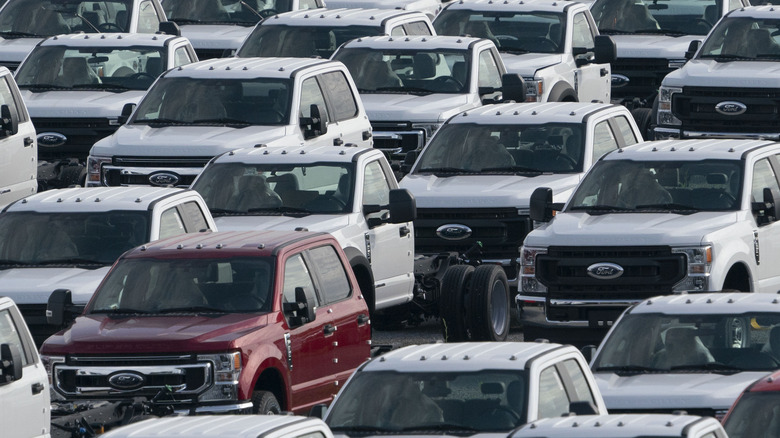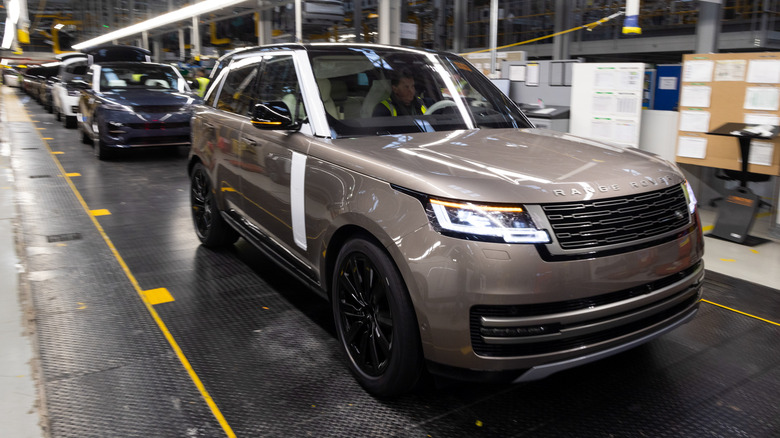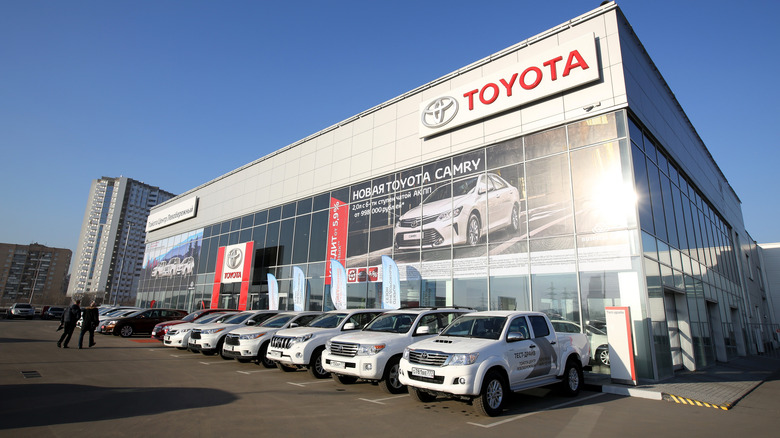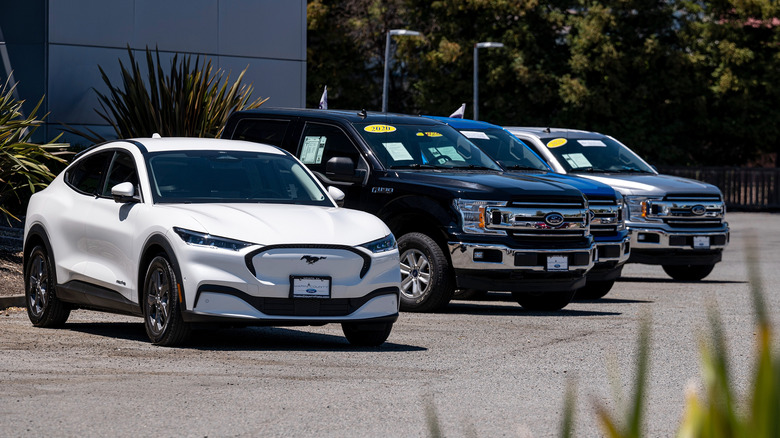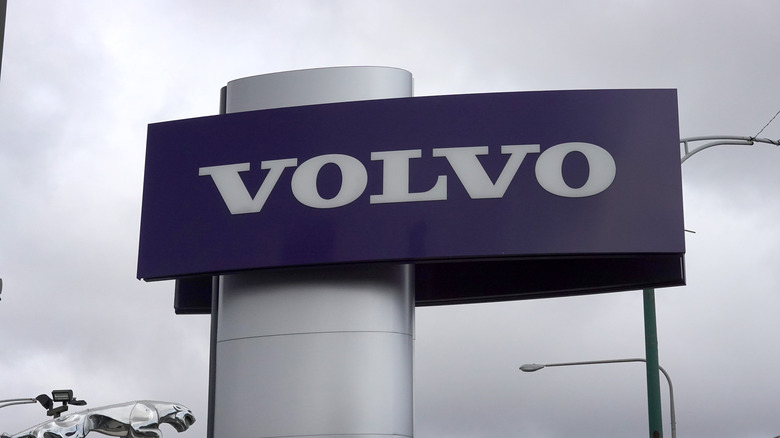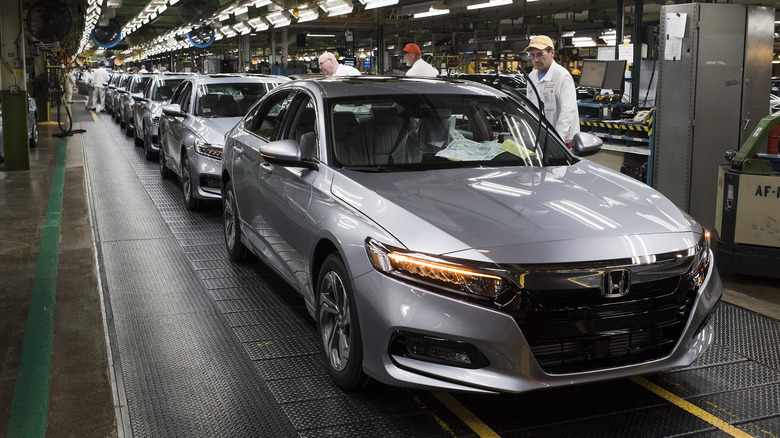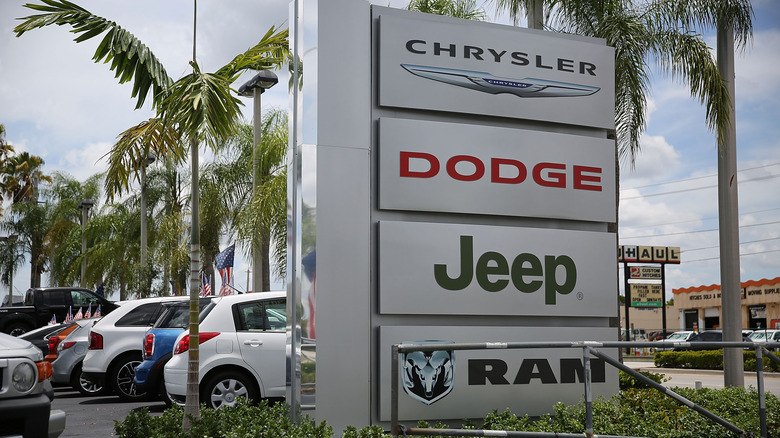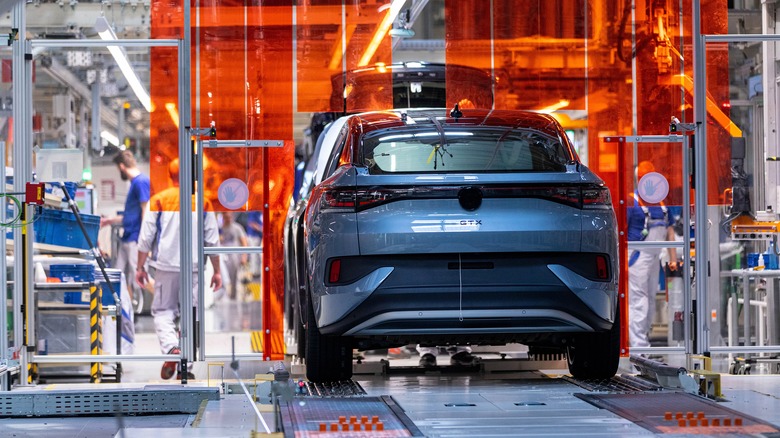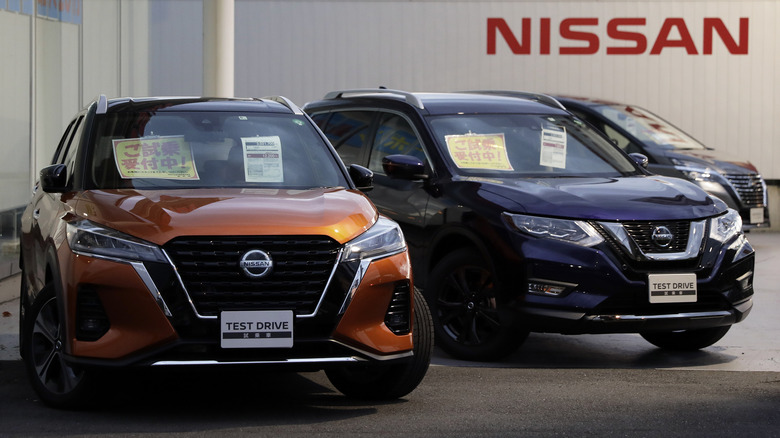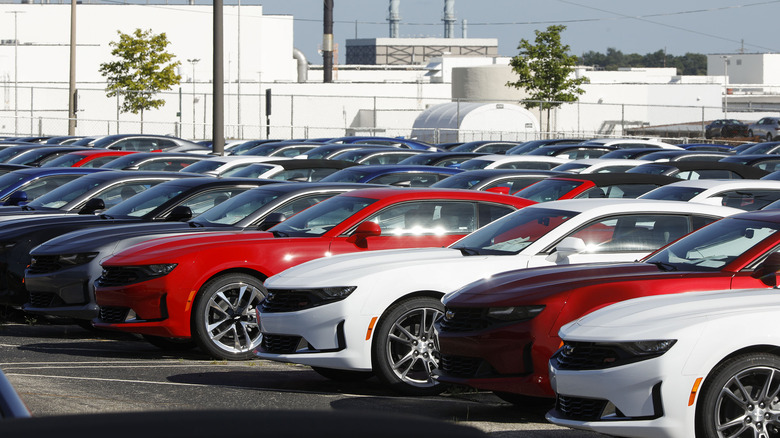Car Companies That Were Impacted Most By The Semiconductor Shortage
The global semiconductor shortage has been wreaking havoc on the tech industry since the initial outbreak of the COVID-19 pandemic, with even the biggest players like Apple forced to cut production in response to the crisis. Alongside consumer technology, the car industry has been among the worst affected sectors, with manufacturers across the world missing vital chips for the complex computer systems that power almost every modern automobile. There have been reports of tens of thousands of vehicles sitting incomplete while awaiting the delivery of these chips, and in some cases, entire factories have been forced to close until supply increases.
Virtually every car manufacturer has been affected to some degree, although some automakers seem to have been hit significantly worse than others. It doesn't look like the problems will ease in the near future, either, and so it could be a rough few years for these ten manufacturers, both for investors and for the workforce whose jobs rely on the continued output of their production lines.
Jaguar Land Rover
It's not been an easy few years for Jaguar Land Rover, with slumping sales of its Jaguar marque causing questions to be asked about the future of the brand. It's been reported that, even though Jaguar still offers both models worldwide, the XE and XF sedans have been essentially discontinued. Although this is partly just due to lower demand from consumers, company executives have claimed that the main reason sedan production has been cut is so that JLR can tackle the backlog of Land Rover and Range Rover orders, which carry a higher profit margin.
The reason for this backlog, reports Auto News, is that the semiconductor shortage is causing a significant drop in overall factory output. Waiting lists for the most popular variants of the Range Rover have reached over a year, with sales suspended altogether in some markets until higher production levels can resume. Jaguar Land Rover is reportedly looking to decrease the production of some of its less profitable models to free up vital resources for its Land Rover and Range Rover line, but as a result, it seems that large parts of Jaguar's lineup have been axed until further notice.
Toyota
Asian automakers have been among the hardest hit by the chip shortage, and over two years since supply issues first began to arise, Toyota has claimed it's unable to say when the crisis will end. In October 2022, the company was reportedly forced to cut its annual output target as production remained lower than expected throughout the latter half of the year. It also warned of waning demand likely over the course of 2023 as several major global economies enter a recession.
Although lower global demand won't be good news for the company's bottom line, it might ironically help ease the semiconductor shortage. For now, demand is still consistently outstripping supply, and Toyota has been forced to shut down several of its Japanese factories for days at a time as a result. Reuters reports that lines including the Corolla, RAV4, and Yaris are most affected. Despite its troubles, Toyota has still seen strong demand for its vehicles, and its production numbers still remain high, with the company producing 8.6 million cars in the previous financial year.
Ford
Ford has had its fair share of failures and flops over the years, but its latest headache is centered around the chip shortage. Like Toyota, Ford was forced to cut production at several of its factories at the start of 2022. Since then, it doesn't look like things have gotten much better for the manufacturer. In an interview, Ford CFO John Lawler said that shortages will continue throughout 2023, and he didn't think there would be any "significant relief" on the horizon. Ford's CEO Jim Farley was even less optimistic, claiming in an interview that he had "stopped forecasting [when it would end]. I mean, [the] bottom line is we think it's going to continue happening in the foreseeable future."
Farley said that it wasn't just semiconductors that were in excessively high demand, but also raw materials for EV batteries. He claimed the shortage of battery components is set to last "for the next decade," with every other manufacturer also set to be hit by supply constraints. At the time of the interview, Ford reportedly had 40-45,000 unfinished vehicles in storage, waiting for parts to be delivered.
Volvo
European manufacturers haven't had it any easier than their Asian and American counterparts, with Volvo announcing the temporary closure of one of its factories in October 2022. Volvo also includes a disclaimer on its website that it has "temporarily adjusted production in most of [its] manufacturing sites to adapt output to the supply situation," so long delays might be possible. The company has so far remained quiet on its outlook for the future and hasn't disclosed if it has any unfinished cars sitting in its inventory.
Volvo's biggest shareholder, the Chinese auto conglomerate Geely, has also been hit by shortages, with its profits reportedly dropping 55% over the first half of 2022. This was blamed on a combination of Covid-related lockdowns in China affecting both production and new car demand, and the semiconductor issue. Geely reported that it expected a recovery during the second half of the year, but at the time of writing, those results haven't been disclosed. With Volvo's ongoing supply chain troubles affecting its profitability, it seems Geely might not be in for quite as quick a recovery as bosses were hoping for.
Honda
Honda's latest earnings call was a strange one, as bosses reported record profits, but said "we can't really be proud of it," according to the Japan Times. These profits were mainly due to a weakening yen, which sits at historically low levels and is skewing financial results to appear more positive than they actually are. In fact, Japan Times reports, if the yen had remained stable, Honda would have instead made a year-on-year decrease in profit. The reason for this lackluster performance is the chip shortage, with Honda reportedly slashing its yearly output predictions by 100,000 vehicles, down to 4.1 million units.
To add to its woes, Honda's executive vice president Kohei Takeuchi said that "shortages of certain types of chips are still severe, so we don't think the worst has passed," adding that American production of CR-V and Civic models were particularly badly affected. For now, executives have said they are unwilling to make too many predictions about the future, but it seems very likely that Honda's production output will continue to be affected by shortages for at least the coming year.
Stellantis
Stellantis, the recently-formed conglomerate that houses brands including Jeep, Dodge, Alfa Romeo, and Fiat, has been dealing with semiconductor shortages throughout the entirety of its short life. The company has said that supply will continue to remain "very complicated" throughout the rest of 2023, although it expects issues to "ease a little" shortly afterward. The company is in the middle of overhauling its entire lineup in the face of impending bans on gas-powered vehicles from global regulators, and by 2030, it aims to have 70% of its European and 40% of its American sales comprised of low-emissions vehicles.
As a result, it's reliant on the plentiful supply of semiconductors more than ever, but it appears that there might already be a light at the end of the tunnel for the automaker. Revenues reportedly rose significantly in the third quarter of 2022, with sales of battery-electric vehicles jumping by 40% over that period. It remains to be seen if Stellantis can keep up the pace over the next quarter, or if constricted semiconductor supply will hobble its production targets once again.
Volkswagen
While there are plenty of other manufacturers that have been left with thousands of unfinished cars due to the chip shortage, few of them have as much inventory as Volkswagen. In October, the automaker claimed to have 150,000 unfinished cars awaiting the delivery of semiconductors, with no end in sight for the disruption. In fact, VW expects that shortages will continue until the end of 2023 at the earliest, with "geopolitical developments" having the potential to make disruptions carry on for much longer.
The "geopolitical development" in question is the U.S. decision to sanction chip exports to China, with company chief executive Oliver Blume calling the sanctions a "growing barrier to technology transfer." VW's head of procurement also shared his boss's concerns, telling a German newspaper that although "investments for new [semiconductor] capacity are now on track [...] there will probably still be a structural shortfall in semiconductors up to and including 2023."
Nissan
After initially predicting that it would sell 4 million units in the 2022 financial year, Nissan lowered its sales estimates in November 2022, reports Supply Chain Dive. Instead, it expected to shift just 3.7 million units, citing issues with lockdowns in China and, like the rest of the industry, semiconductor shortages. It appears that the company's production issues have been very localized, however, with a 23.5% drop in production in China offsetting a gain in output that Nissan's factories in other parts of the world had reported. Like many of the other automakers here, Nissan retained a bright outlook for the second half of the financial year but stressed that uncertainties around the state of Chinese lockdowns could still derail its recovery plans.
The company's COO Ashwani Gupta said on an earnings call that even if Chinese production volume resumed to more normal levels, the ongoing semiconductor issue would likely have a lasting effect going into the new year. However, Nissan has been attempting to use alternative chips and dual sourcing to alleviate some of the bottlenecks, and if it's successful, it should go a long way to remedying the situation for the 2023 financial year and beyond.
Mazda
While things might be starting to look up at Nissan, fellow Japanese automaker Mazda is still deep in the worst of its semiconductor crisis. In November 2022, it claimed things were so bad that it couldn't even predict what its production output would look like for the next two weeks, never mind the next financial year. Earlier in the year, Mazda had already reportedly cut some of the convenience features from its 3 and CX-5 models, in a bid to save on precious chips.
It seems like things haven't gotten much better since then, and the automaker expects supply to remain tight until at least the end of 2023. Bosses also expect the looming global recession to have an impact on the trim of cars that customers buy, with the company expecting to see sales of its lowest-priced trims see the strongest growth as customers tighten their spending, reports Reuters. Despite these headwinds and the chip shortage continuing for the foreseeable future, Mazda has predicted a rise in its operating profits for 2023, primarily due to the weakening yen.
GM
American automaking giant GM has been one of the domestic manufacturers hardest hit by the chip shortage, reportedly building 95,000 vehicles it can't sell because of missing parts. Not only is this taking up room in storage facilities, but it's also hampering overall sales, with customers less willing to shell out for vehicles with long estimated delivery times. This has been made worse by the fact that the majority of the vehicles GM is waiting on parts for are in high-demand segments. Around 75% of the parked vehicles are said to be trucks and full-size SUVs, which are not only two of the best-selling segments, but are also where the highest profit margins can be found.
Even though it's struggling to keep production numbers high enough to meet demand, that demand doesn't seem to be waning too much. The chip shortage might have already lost GM its bestseller crown, but it has predicted consistently strong sales ahead, with a particular boost in demand for commercial midsize pickups. Let's hope that the company's predictions are correct and that no further supply chain disruptions come along to thwart its plans in 2023.
